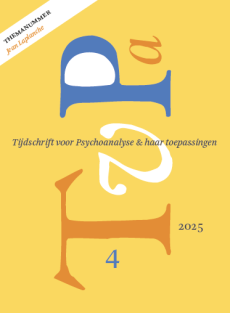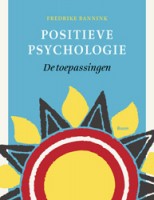Het vreemde van de psychoanalyse
Summary
The strangeness of psychoanalysis
This article traces of the relationship between psychoanalysis and hermeneutics. The key concern of hermeneutics is to be found in the struggle against alienation in favour of appropriation i.e. internalisation of what seems to be alien to the subject. Psychoanalysis may be conceptualised in the same way, so that both ways of thinking and practice share a solid common ground.
Present-day culture, however, seems to be becoming more and more hostile to the goal of appropriation, favouring not internalisation but exclusion of ‘otherness’. This might explain the difficult position in which psychoanalysis finds itself in present-day culture. Different approaches are suggested that might help psychoanalysis to meet this challenge.
Literatuur
- Baart, A. (2001). Een theorie van de presentie. Utrecht: Lemma.
- Bollas, Ch. (2002). Free Association. Cambridge: Icon.
- Freud, S. (1905). Drie verhandelingen over de theorie van de seksualiteit. Sigmund Freud, Nederlandse Editie: Klinische beschouwingen 1 (p. 47-177). Amsterdam/Meppel: Boom.
- Fechtenhauer, D. & Buunk, A.P. (2002). Irrationele en onbewuste aspecten van gedrag: een evolutionaire verklaring. Nederlands Tijdschrift voor Psychologie, 57,125-144.
- Freud, S. (1923). ‘Psychoanalyse’ und ‘Libidotheorie’. Sigmund Freud, Gesammelte Werke XIII (p. 209-233). Frankfurt a.M.: S. Fischer.
- Glas, G. (2004). Emotie, neurobiologie en de toekomst van de psychotherapie. Tijdschrift voor psychotherapie, 30, 6-21.
- Grondin, J. (1994). Der Sinn für Hermeneutik. Darmstadt: Wissenschaftliche Buchgesellschaft.
- Grünbaum, A. (1984). The Foundations of Psychoanalysis. A Philosophical Critique. Berkeley/Los Angeles/Londen: University of California Press, p. 173-267: Part II. The Cornerstone of the Psychoanalytic Edifice: Is the Freudian Theory of Repression Well Founded?
- Habermas, J. (1988). Der philosophische Diskurs der Moderne. Frankfurt a.M.: Suhrkamp, tweede druk.
- Havenaar, J.M., Os, J. van, Wiersma, D. (2004). Algemene meetinstrumenten in de psychiatrische praktijk. Tijdschrift voor Psychiatrie, 46, p. 647-553.
- Hengeveld, M.W. (2004). How can we know the dancer from the dance? Psychiatrie tussen materie en betekenis. Oratie. Amsterdam: Benecke.
- Ineichen, I. (1991). Philosophische Hermeneutik. München: Karl Aber.
- Kräpelin, E. (1909). Psychiatrie. J. Band. Allgemeine Psychiatrie. Leipzig: Barth, achtste druk, p. 464-505: Psychische Untersuchung.
- Lacan, J. (1966). Écrits. Parijs: Du Seuil.
- Lacan, J. (1973). Les quatre concepts fondamentaux de la psychanalyse. Le séminaire de J. Lacan. Livre XI. Parijs: Seuil.
- Leeuwen, W.F. van (1973). Psychoanalytisch minimum. In A.P. Cassee. e.a. (red.), Klinische psychologie in Nederland (p. 56-79). Deventer: Van Loghum Slaterus.
- Mooij, A. (2002). Psychoanalytisch gedachtegoed. Een modern perspectief. Amsterdam: Boom.
- Mooij, A. (2004). Toerekeningsvatbaarheid. Over handelingsvrijheid. Amsterdam: Boom.
- Nasio, J.-D. (1991). La guérison: un point de vue lacanien. Esquisses psychanalytiques, 15, 179-189.
- Ricoeur, P. (2003). The question of proof in Freud’s psychoanalytic writings. In P. Ricoeur, Hermeneutic and the Human Sciences (p. 247-274). Cambridge/Parijs: UP/Maison des Sciences de l’Homme, negende druk.
- Taylor, Ch. (1991). The Malaise of Modernity. Don Mills: Sodart Publishing Co.
- Visser, G. (1998). De druk uan de beleving. Nijmegen: SUN.
 © 2009-2026 Uitgeverij Boom Amsterdam
© 2009-2026 Uitgeverij Boom Amsterdam
ISSN 1382-516x
De artikelen uit de (online)tijdschriften van Uitgeverij Boom zijn auteursrechtelijk beschermd. U kunt er natuurlijk uit citeren (voorzien van een bronvermelding) maar voor reproductie in welke vorm dan ook moet toestemming aan de uitgever worden gevraagd:
Behoudens de in of krachtens de Auteurswet van 1912 gestelde uitzonderingen mag niets uit deze uitgave worden verveelvoudigd, opgeslagen in een geautomatiseerd gegevensbestand, of openbaar gemaakt, in enige vorm of op enige wijze, hetzij elektronisch, mechanisch door fotokopieën, opnamen of enig andere manier, zonder voorafgaande schriftelijke toestemming van de uitgever.
Voor zover het maken van kopieën uit deze uitgave is toegestaan op grond van artikelen 16h t/m 16m Auteurswet 1912 jo. Besluit van 27 november 2002, Stb 575, dient men de daarvoor wettelijk verschuldigde vergoeding te voldoen aan de Stichting Reprorecht te Hoofddorp (postbus 3060, 2130 KB, www.reprorecht.nl) of contact op te nemen met de uitgever voor het treffen van een rechtstreekse regeling in de zin van art. 16l, vijfde lid, Auteurswet 1912.
Voor het overnemen van gedeelte(n) uit deze uitgave in bloemlezingen, readers en andere compilatiewerken (artikel 16, Auteurswet 1912) kan men zich wenden tot de Stichting PRO (Stichting Publicatie- en Reproductierechten, postbus 3060, 2130 KB Hoofddorp, www.cedar.nl/pro).
No part of this book may be reproduced in any way whatsoever without the written permission of the publisher.
Nieuwsbrief Boom Psychologie
Meld u nu aan en ontvang maandelijks de Boom Psychologie nieuwsbrief met aantrekkelijke aanbiedingen en de nieuwe uitgaven.
Aanmelden


